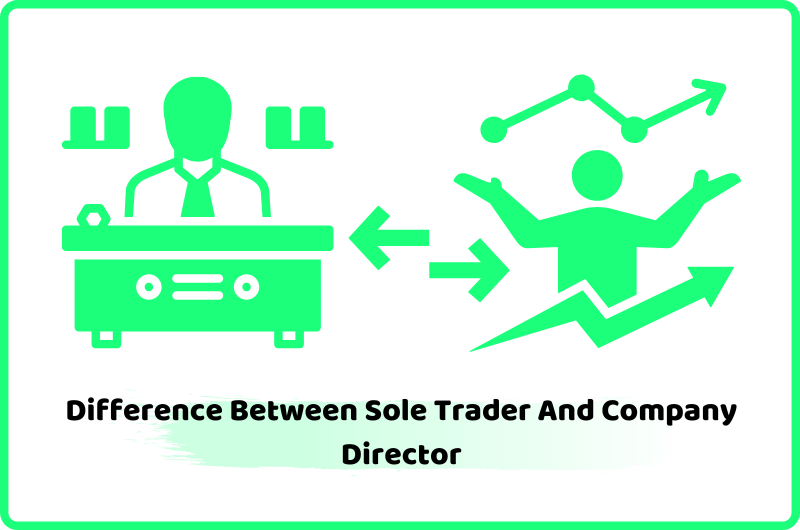Difference Between Sole Trader And Company Director
Anyone seeking to begin a business enterprise in the UK needs to know their options between starting as a sole trader or becoming a company director. Every business owner must select between being a sole trader or forming a limited company while assuming the role of company director. A business entity brings its collection of benefits and duties, as well as tax system elements. Reading this guide will enable you to understand the difference between sole trader and company director functions to decide which business structure fits your goals better.
Need help with your Self Assessment Tax Return? Let us make it simple for you.
What is a Sole Trader?
A sole trader operates as a self-employed business entity that maintains full ownership of the company and operates independently. They are personally responsible for all business debts and liabilities. This is the simplest business structure in the UK.
Now we discuss the outcome of sole trader pros and cons below:
Pros of Being a Sole Trader
- Easy to Set Up: Sole trader registration at HMRC creates a simple setup procedure.
- Full Control: As a sole trader, you retain complete control over your business decisions because you do not need permission from directors or shareholders for anything.
- Lower Accounting Costs: Less paperwork compared to a limited company.
- Privacy: Unlike limited companies, sole traders do not need to publicly disclose financial information.
Cons of Being a Sole Trader
- Unlimited Liability: Personal assets are at risk if the business incurs debts.
- Higher Tax Rates: All business profits from sole trading result in paying Income Tax and National Insurance to the government.
- Limited Growth Potential: Getting new investments or obtaining substantial contracts proves challenging due to limited growth potential.
What is a Company Director?
A company director is an individual appointed to run a limited company. The business is legally separate from the director, meaning the company is responsible for its debts. As a company director, you must register for self-assessment for a company director.
Pros of Being a Company Director
- Limited Liability: The protection of your assets remains intact when financial difficulties affect your company.
- Tax Efficiency: Tax efficiency works because directors can obtain their compensation through salary and dividend payments to minimise their tax responsibility.
- Business Credibility: The professional aspect and higher level of trust that limited companies offer enhances business credibility.
- Easier to Secure Investment: Investors prefer limited companies over sole traders.
Cons of Being a Company Director
- More Administration: The organisation needs to register with Companies House, along with maintaining regular reporting requirements.
- Higher Accounting Costs: Sole traders need simpler financial management than directors of companies who face elevated accounting responsibilities.
- Less Privacy: Company financial records and business accounts remain accessible to the public domain.
Tax Difference Between Sole Trader And Company Director
Here are some tax differences between a sole trader and a company director.
Sole Trader Tax
- Pays taxes on your Income profits at rates of 20%, 40%, or 45%.
- Pays Class 2 and Class 4 National Insurance Contributions (NICs).
- No need to file Corporation Tax returns.
Company Director Tax
- The company pays Corporation Tax rate currently 19% for profits below £50,000. And 25% for profit above £250,000.
- Directors take a salary (subject to PAYE and NICs) and can withdraw dividends, which are taxed at lower rates.
- May need to file a Self-Assessment tax return in addition to company accounts.
Liability and Legal Responsibilities
Your business structure affects how much personal risk you take on, what taxes you pay, and the legal responsibilities you must fulfill.
Sole Trader
- Your business status creates a legal connection that establishes you and your business as one unified entity.
- Your business status reveals all risks, as unlimited liability exposes your possessions to business obligations.
- Must submit a Self-Assessment tax return annually.
- Income Tax and National Insurance Contributions (NICs) are taxes that employers need to pay for their employees.
Company Director
- You maintain a separate legal status from the company.
- As a company entity, your assets remain safe.
- Must submit annual accounts, tax returns, and Companies House filings.
- The company must pay Corporation Tax together with PAYE tax and dividends tax.
Choosing the Right Business Structure
Before I describe the difference between sole trader and company director, it helps you to select the right business structure, which is a major decision that affects your taxes, legal responsibilities, and growth potential.
Choose Sole Trader If:
- Establishing your business structure should include easy procedural requirements.
- The business structure meets your needs because it serves freelancers or small business owners whose main risk level is low.
- Your business requirements include full control and low administrative costs.
Choose Limited Company If:
- The protection of personal assets from business debts drives you toward this business structure.
- The business will expand and attract financial investors
- Your goal is to decrease your tax burden by maintaining salary pay and dividend distributions.
Conclusion
Your business decision between status as a sole trader and company director should align with your financial position, risk tolerance, and business expansion plans. Understanding the difference between sole trader and company director is crucial. Being a sole trader provides flexible management and ease, while a limited company enhances financial safety and tax benefits. Speaking to an accountant or business advisor brings clarity to make the right business setup decisions based on your requirements.
Get in touch with our young, clever, and tech-driven professionals if you want to choose the solution to tax burden or accounting problems in the UK for your income. We will ensure to offer the best services.


